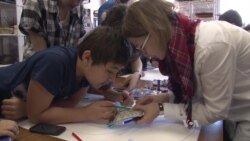Russian authorities have been using a “foreign agents” law from 2012 to blacklist groups receiving international funding and engaging in activities deemed political. The vague law implies such activities are disloyal and has been applied to more than 100 organizations, many of them charities forced to scale back their activities or shut down.
One of the latest victims was the Learning Center for Refugee Children in Moscow, part of a nongovernmental organization called the Civic Assistance Committee that offers help to refugees.
In one of the center's recent classes, refugee children drew maps of Moscow in a class on Russian culture and customs taught by volunteers. But the children, who had fled from Afghanistan, Congo, Syria and elsewhere, had gathered in a temporary classroom — in a pottery studio. The center had been evicted earlier this year from its home of nearly two decades without explanation.
“The situation developed... when the Civic Assistance Committee was deemed a foreign agent," said volunteer teacher Denis Lanschikov. "During that same week, it happened we got a letter saying we had three months to vacate the location. It's not a coincidence. It can't be."
Svetlana Gannushkina, chair of the Civic Assistance Committee, said the fund that had been supporting the children's program "called us and asked directly if we had been entered into the Registry of Foreign Agents. We replied, ‘Yes.’ In two days, we received their letter refusing to finance the center.”
The center began in the 1990s, helping children displaced from war in Chechnya who were unable to enroll in Russian schools. It expanded to help as many refugee children as possible learn Russian to better integrate into society.
“Unfortunately, we are their only option," said Olga Nikolaenko, director of the Learning Center for Refugee Children. "Our kids who attend school will probably drop out. If they can't find help here, they'll have great difficulties and no one will help them keep oriented in the right direction."
Refugees attending the classes agree.
“If I don’t have these people, I think I will hate Moscow," said Samer Alyazidi, a refugee from Yemen. "It would really be boring. Really.”
Despite their dwindling resources, the center's volunteers are staying optimistic. They will continue to hold classes for refugee children, they say, as long as they have a place to teach, however temporary.
Mark Grinberg contributed to this report.





